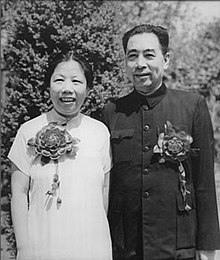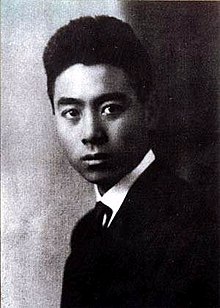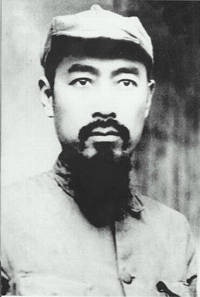Zhou Enlai
Zhou Enlai , also Tschu En Lai or Chou En-Lai ( Chinese 周恩來 / 周恩来 , Pinyin Zhōu Ēnlái , W.-G. Chou Ên-lai ; * March 5, 1898 in Huai'an , Jiangsu Province ; † January 8, 1976 in Beijing ) was a major leader of the Communist Party of China and Prime Minister of the People's Republic of China from 1949 until his death.
Mao Zedong's longtime comrade-in- arms was seen as the intellectual leader of the CCP within the revolutionary movements and also from the point of view of his political opponents .
Childhood and youth

Zhou Enlai was born in Huai'an , Jiangsu Province , into a middle-class family.
He spent the first years of his life with his grandfather Zhou, a former high state official of the Manchu dynasty , who was also mayor of Huai'an and from whom he received a classical education. When he was about ten years old, the family handed his upbringing to an uncle in Shenyang , where he attended a modern elementary school.
From 1913 to 1917, Zhou Enlai went to the Nankai Middle School in Tianjin , which was run by American missionaries , where he soon played a leading role in the student movement and came up with revolutionary ideas.
Studies and stays abroad
In 1917, Zhou Enlai went to Japan and studied Japanese for a year at Waseda University , then he moved to Kyoto University .
In 1919 he returned to China and enrolled at Nankai University in Tianjin. In the following year, he and 1,500 other young Chinese made use of the opportunity to study in France . However, there is no evidence that he ever attended lectures. Zhou had enough money from his wealthy family. This enabled him to travel to England , Belgium and Germany . He stayed in Berlin and Göttingen .
When he returned to China, he was arrested for his supposedly radical views. Zhou was released in 1920, after which he studied in France, England and Germany. Zhou joined the Chinese Communist Party in 1921 and returned to China in 1924, where the united front between the CCP and the Kuomintang had since been formed. Zhou also held important positions in the institutions of both parties; u. a. he was chairman of the political committee of the Whampoa Military Academy .
In 1925, in Tianjin, he married Deng Yingchao , a leader of the student organization. She later became a major leader in the Chinese Communist Party. The couple had no children, but they adopted many orphans from "martyrs of the revolution". One of these children was the future Prime Minister Li Peng .
Political career
Zhou gained national fame during the May Fourth Movement, 1919. He led an attack on a government office during student protests against the Treaty of Versailles . In 1920 he moved to France, where he was active with revolutionary Chinese students, joined the French Communist Party in 1921 and toured half of Europe.
When Zhou returned to China, he began working as chairman of the political committee at the Whampoa Military Academy in 1926. The military academy was founded jointly by the communists and nationalists. The communists installed Zhou as a counterbalance to Chiang Kai-shek's nationalism .
After the start of the Northern Expedition of the Kuomintang Zhou worked as laborers agitator. In 1926, Zhou organized a general strike in Shanghai and opened the city to the Kuomintang. After the communists broke with the Kuomintang, Zhou managed to flee the white terror. He managed to make his way to Jiangxi Province , the communist stronghold. There Zhou moved away from orthodox, urban-centered communism to the Maoist ideology of rural revolution. It was here that Zhou became one of the most important leaders of the Communist Party. This transition ended with the beginning of the Long March . In January 1935, Zhou Mao helped fight the 28 Bolsheviks .
In the years when the Communist Party was based in Yan'an , Zhou fought for a united front against Japan. Zhou played an important role in the Xi'an incident . He negotiated with the nationalists in the Chinese civil war . During the Sino-Japanese War, Zhou was ambassador to the Kuomintang in their transitional capital, Chongqing . He also took part in the failed negotiations after the end of World War II.
In 1949, after the establishment of the People's Republic of China, Zhou was Prime Minister and Foreign Minister. In June 1953, he promulgated the Five Declarations of Peace . He was chairman of the communist Chinese delegation at the Geneva Conference in 1954 and the Bandung Conference in 1955. On April 1, 1955, the Austrian doctor and writer Fritz Jensen was killed in an airplane attack by the Kuomintang against him . In 1958, Zhou relinquished the post of Foreign Minister to Chen Yi , but remained Prime Minister. He was also the chairman of the Political Consultative Conference of the Chinese People from 1954 to 1976 . He was a popular politician and retained his offices during the Great Leap Forward and the Cultural Revolution .
Zhou was always loyal to Mao and enjoyed Mao's trust even during the Cultural Revolution. Zhou was responsible for ensuring that the economy, and thus the people's livelihood, continued to run as smoothly as possible. Mao was never interested in economics. His loyalty to Mao was also due to his deep concern that China might fall apart again and sink into war.
At the end of his life, Zhou expressed his concern for the future and internal unity of China in a pessimistic legacy that he circulated among senior officials: “Our generation has never had quiet days. If we went to sleep carelessly, our people and our party would fall apart and millions of heads would roll. "
Zhou made relations with the West possible in the 1970s. In February 1972 he welcomed the American President Richard Nixon on his visit to China and signed the Shanghai Communiqué with him .
Zhou was first diagnosed with bladder cancer in November 1972 . The medical team reported that if treated immediately, he had an 80 to 90 percent chance of recovery, but medical treatment for the highest party members had to be approved by Mao. Mao ordered that Zhou and his wife should not find out about the diagnosis, that no surgery should be performed, and no further examination should be done. The following year, Zhou had significant urine bleeding. After pressure from other Chinese leaders who learned of Zhou's condition, Mao finally ordered surgical treatment in June 1974, but metastases had already formed in other organs.
He then gave many of his functions to Deng Xiaoping . On January 8, 1976, Zhou died a few months before Mao Zedong . In April 1976, the day before the Chinese Memorial Day , wreaths and flowers in memory of Zhou were removed by the police in what is commonly referred to as the Tian'anmen Incident .
Zhou Enlai's successor was Hua Guofeng .
See also
Fonts
- Zhou Enlai, Selected Writings. Volume I. Foreign Language Literature Publishing House, Beijing 1981.
- Tschou En-lai, Speeches and Writings 1949–1976. Rote Fahne publishing house, Cologne 1976, ISBN 3-8106-0024-5 .
literature
- Percy Jucheng Fang, Lucy Guinong J. Fang: Zhou Enlai - a portrait. Translated from English by Ruth F. Weiss. Foreign Language Literature Publishing House, Beijing 1990; ISBN 7-119-00815-3 .
- Thomas Weyrauch: China's neglected republic. 100 Years in the Shadow of World History , Volume 1: 1911–1949 . Longtai, Giessen (ie) Heuchelheim 2009; ISBN 978-3-938946-14-5 .
- Chou En-lai , in: Internationales Biographisches Archiv 14/1976 of March 22, 1976, in the Munzinger Archive ( beginning of article freely available)
Web links
- Literature by and about Zhou Enlai in the catalog of the German National Library
- Newspaper article about Zhou Enlai in the 20th century press kit of the ZBW - Leibniz Information Center for Economics .
- The Mystery of Zhou Enlai ( Jonathan Spence ; English)
- Zhou Enlai Peace Institute (English)
- The red star: Tschu En-lai ( The time of July 15, 1954)
- He wrote an essential chapter in contemporary history ( Frankfurter Rundschau of January 10, 1976)
- He could hardly be resisted. The Chinese Prime Minister Tschou En-lai 1898-1976 ( Der Spiegel of January 12, 1976)
- Tschu En-lai ( East Asia Institute at Ludwigshafen University )
swell
- ↑ Chiang Kai-shek 1954: "He is the powerful, the more dangerous, clever head." Interview in the time 1954/28, The red star: Tschu En-lai .
- ↑ Anna Wang: I fought for Mao. A German woman experiences the Chinese revolution . Christian Wegner, Hamburg 1964, p. 125.
- ↑ Anna Wang: I fought for Mao . Christian Wegner, Hamburg 1964, p. 126.
- ↑ Anna Wang: I fought for Mao . Christian Wegner, Hamburg 1964, p. 123.
- ^ Andreas Mettenleiter : Personal reports, memories, diaries and letters from German-speaking doctors. Supplements and supplements III (I – Z). In: Würzburg medical history reports. Volume 22, 2003, pp. 269-305, here: p. 269.
- ↑ Teng: The main thing is that the cat catches mice . Der Spiegel, January 12, 1976 .
- ^ Wolfram Eberhard : History of China. From the beginnings to the present (= Kröner's pocket edition . Volume 413). 3rd, expanded edition. Kröner, Stuttgart 1980, ISBN 3-520-41303-5 , p. 426.
- ↑ Wenqian Gao: Zhou Enlai - The Last Perfect Revolutionary - A Biography , PublicAffairs, 2007, pp. 235-236
| predecessor | Office | successor |
|---|---|---|
| - |
PRC Premier 1949–1976 |
Hua Guofeng |
| personal data | |
|---|---|
| SURNAME | Zhou Enlai |
| ALTERNATIVE NAMES | 周恩来 (simplified Chinese); 周恩來 (traditional Chinese); Chou Ên-lai (Wade-Giles) |
| BRIEF DESCRIPTION | Chinese Prime Minister, Leader of the Chinese Communist Party |
| DATE OF BIRTH | March 5, 1898 |
| PLACE OF BIRTH | Huai'an , Jiangsu Province |
| DATE OF DEATH | January 8, 1976 |
| Place of death | Beijing |



